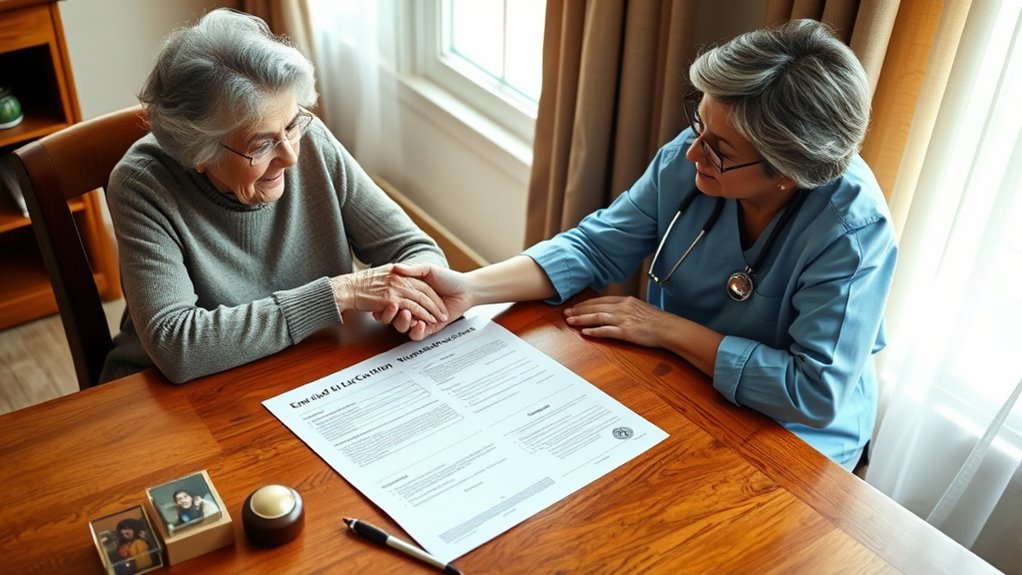As a caregiver, your role in end-of-life care planning is vital for ensuring your loved one’s wishes are clear, respected, and documented with compassion. You facilitate open discussions about values and preferences, organize family conversations, and support ongoing updates as circumstances change. Your involvement helps reduce confusion and emotional burden, builds consensus, and promotes dignity. To make this process smoother and more effective, there’s much more to discover about guiding your loved one thoughtfully through this important journey.
Key Takeaways
- Facilitate open, compassionate discussions about the loved one’s values and care preferences.
- Assist in completing and documenting advanced directives to ensure wishes are clear.
- Coordinate family communication to align expectations and address cultural or spiritual considerations.
- Support ongoing updates to care plans as circumstances and preferences evolve over time.
- Advocate for the loved one’s autonomy, ensuring their wishes are respected and documented throughout care.

When it comes to end-of-life care planning, caregivers play a crucial role in ensuring their loved ones‘ wishes are respected and met. One of the most important steps you can take is helping your loved one establish advanced directives. These legal documents specify their preferences for medical treatment if they become unable to communicate. By having these directives in place, you guarantee their wishes are clear, reducing confusion or disagreements during difficult times. Assisting with the completion of advanced directives involves discussing their values, beliefs, and priorities openly. It’s imperative to approach these conversations with sensitivity, creating a safe space where they feel comfortable sharing their preferences. Your role is to listen carefully, clarify any questions, and encourage them to document their choices clearly. Recognizing the importance of emotional support** can help ease the emotional burden during these discussions. Family communication is another essential aspect of end-of-life planning. As a caregiver, you often serve as the bridge between your loved one and the rest of the family. Facilitating honest, compassionate conversations helps prevent misunderstandings and ensures everyone is on the same page. It’s worth organizing family meetings where you can discuss care wishes, address concerns, and align everyone’s expectations. These discussions might include topics like preferred care settings, spiritual or cultural considerations, and financial arrangements. By fostering open communication, you help build consensus and reduce the emotional burden on family members who may struggle to navigate these sensitive issues alone. Remember, clear communication also involves updating family members if your loved one’s wishes change over time. Your proactive involvement in these conversations demonstrates respect for your loved one’s autonomy. It also provides peace of mind for everyone involved, knowing that their preferences are documented and shared. As you work through advanced directives and family discussions, keep in mind that these conversations can be ongoing. End-of-life care planning isn’t a one-time event but a process that evolves as circumstances and wishes change. Your role is to support, advocate, and guarantee that your loved one’s voice remains central. By doing so, you not only honor their dignity but also foster a sense of security and trust** within your family. Ultimately, your efforts in facilitating these important discussions help create a compassionate, respectful approach to end-of-life care that aligns with your loved one’s values and desires.
Frequently Asked Questions
How Can Caregivers Handle Emotional Stress During End-Of-Life Planning?
You can handle emotional stress during end-of-life planning by practicing stress management techniques like deep breathing, mindfulness, or taking short breaks. Building emotional resilience helps you stay grounded and focused. Don’t hesitate to seek support from friends, family, or a counselor. Remember, caring for yourself is essential so you can provide the best support. Prioritize self-care, stay connected, and allow yourself to grieve and process your feelings.
What Legal Documents Should Caregivers Ensure Are Prepared?
Did you know that over 50% of adults haven’t prepared legal documents for end-of-life care? As a caregiver, you should guarantee you have advance directives and a power of attorney in place. These documents specify your loved one’s wishes and grant you the authority to make decisions if they can’t speak for themselves. Preparing these legal documents now can prevent confusion and ensure their wishes are respected.
How Do Caregivers Communicate Effectively With Medical Teams?
You should communicate effectively with medical teams by asking clear questions about medical terminology and treatment options, ensuring you understand your loved one’s condition and choices. Be proactive in sharing relevant information and concerns, and take notes during discussions. Use simple language when requesting explanations, and don’t hesitate to clarify anything confusing. This active engagement helps you make informed decisions and supports your loved one’s care plan.
What Resources Are Available for Caregiver Support?
Support groups and respite care are fantastic resources for caregivers. Support groups provide a safe space to share stories, seek solace, and find strength from others facing similar struggles. Respite care offers temporary relief, giving you time to recharge physically and emotionally. Both resources can help you manage stress, stay resilient, and provide the best possible care for your loved one. Don’t hesitate to explore these helpful, healing options.
How Can Caregivers Respect Patient Wishes in Decision-Making?
You can respect patient wishes by prioritizing their autonomy, ensuring they make decisions about their care whenever possible. Listen actively and ask about their values and preferences, demonstrating cultural sensitivity to honor their background and beliefs. Keep open communication, clarify their wishes regularly, and collaborate with healthcare providers to support their choices, empowering them to maintain control and dignity throughout the end-of-life process.
Conclusion
As a caregiver, your involvement is crucial in shaping meaningful end-of-life care plans. Remember, studies show that patients who discuss their wishes with loved ones are 2.5 times more likely to experience care aligned with their preferences. By staying engaged and proactive, you guarantee your loved one’s final days are respectful and comfortable. Your role makes a difference—embrace it to provide the compassionate support they deserve during this important time.









